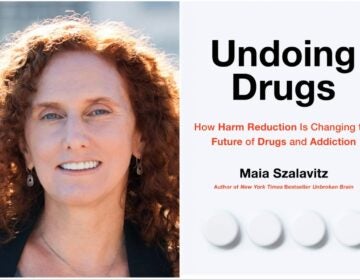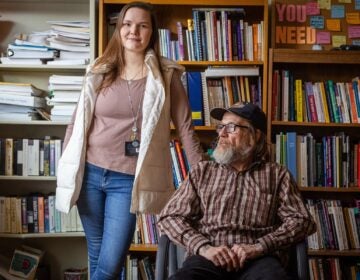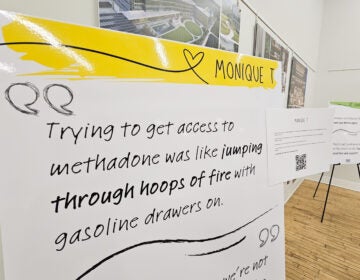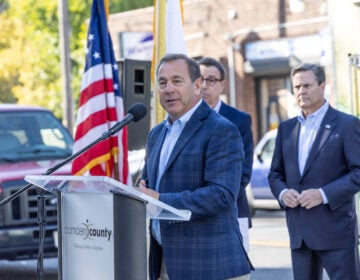New Jersey using millions from opioid settlement to expand support for people in recovery
“Overdose deaths are preventable,” said Dr. Kaitlan Baston. “These are preventable diseases.”
Listen 1:08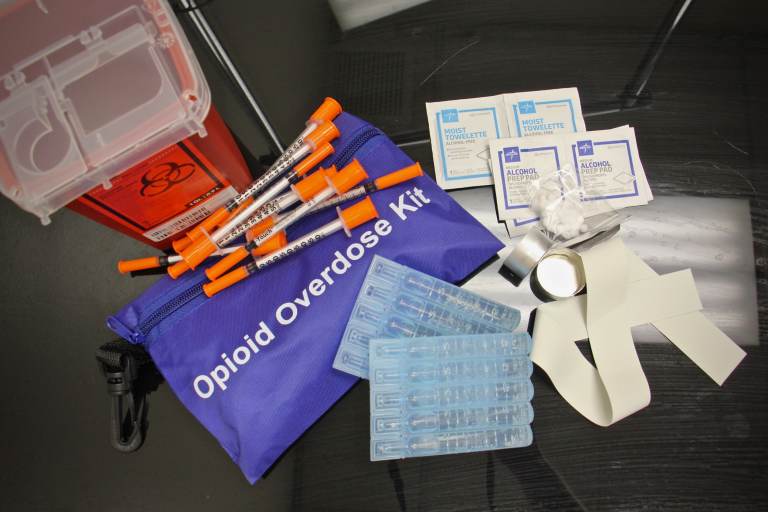
The needle exchange at Oasis in Atlantic City, N.J. provides more than clean needles. The kit includes sterile water, clean works, and an overdose prevention kit. (Emma Lee/WHYY)
From Camden and Cherry Hill to Trenton and the Jersey Shore, what about life in New Jersey do you want WHYY News to cover? Let us know.
New Jersey Gov. Phil Murphy on Thursday unveiled what he described as a historic effort to combat the opioid crisis in the Garden State.
During a visit to the North Jersey Community Research Initiative, Murphy said over the next three years, more than $95 million will be invested into a range of evidence-based strategies to expand care and support individuals in recovery.
“The funding is not coming from the pockets of New Jersey’s taxpayers. Instead, this funding is actually coming from settlement payments we are receiving from the opioid industry itself,” he said.
In 2022, New Jersey began receiving money from a major nationwide litigation settlement that holds opioid manufacturers, distributors, and retailers accountable for creating and fueling the opioid epidemic, by aggressively marketing prescription opioids while downplaying their risks.
New Jersey will receive over $1 billion in total settlement funds, which will be allotted over the next 14 years.
The governor said the money will be used to expand harm reduction centers and community peer recovery centers, as well as medication-assisted treatment programs, a program focused on keeping families together during drug recovery and expanded housing assistance for individuals with substance abuse disorders.
“Expanding support for our neighbors struggling with addiction, rather than throwing them behind bars saves lives, and improves community health more broadly,” said Murphy.
Sarah Adelman, the commissioner of the New Jersey Department of Human Services said the fight against the opioid epidemic touches her personally.
“I have lived every day of my life impacted by addiction, as the daughter of someone who struggled with substance use and for years with opioid use disorder, until I lost them from complications from addiction,” she said.
She said as a child and a caregiver, “I have experienced the hope and devastation that comes with the high and low points of that journey, and I have witnessed and felt acutely the impacts of stigma and shame that take their toll and rob people of their dignity, it is heartbreaking.”
“It’s not right,” said Adelman, “and it is so much worse knowing there are many people in the healthcare industry who perpetuated this crisis for profit.”
Breaking down the investments
Adelman, who chairs the Opioid Recovery and Remediation Advisory Council, said a strategic plan is being developed to spend the billion-plus dollars the state will receive through 2038. The initial tranche over the next three years includes:
- $24 million allocated for harm reduction expansion activities
- $17.5 million to support community peer recovery centers
- $9 million to expand mobile medication for addiction treatment
- $8.1 million to enhance the New Jersey Keeping Families Together program
- $19.5 million to create a rapid referral platform for low-threshold medication access
- $17 million to develop a new continuum of housing supports for those in recovery
- $500,000 to purchase critical supplies
Dr. Kaitlan Baston, the acting commissioner of the New Jersey Health Department, said we are making progress in fighting opioid addiction, but there is still much work to be done.
“The good news is we have tools that work,” she said, “overdose deaths are preventable, these are preventable diseases.”
She explained harm reduction activities include “practical, tangible treatments that people are going to get, that includes keeping them alive with emergency naloxone, it means the kind of services that prevent infections and keep people out of the hospital or worse, death from these illnesses.”
Solomon Middleton Williams, whose parents suffered from substance abuse disorder, is a member of the Opioid Recovery and Remediation Advisory Council.
He stressed the state’s Keeping Families Together program is vitally important.
“My siblings and I were taken away, put into the foster care system while other families stayed together, simply because our parents needed help,” he said. “It was confusing and heartbreaking.”
Williams, who also serves as the deputy director for the Newark Community Street Team, said the council worked hard “to ensure the voices of everyday people grappling with addiction, families torn apart, and those who are fighting for their loved ones are woven into these recommendations (about how the funds will be spent).
The Governor noted in 2022, there were more than 3,000 opioid-related deaths in the state, but last year that number dropped below 3,000.
“Just think about that, these are, each and every one of them precious lives, and those numbers, anything north of zero is unacceptable, and we have to stay on this journey together,” he said.
The Governor said the allotment of funds recommended by the Opioid Recovery and Remediation Advisory Council will allow programs and services to be offered in more communities across the state, “especially our Black and brown communities, which now are tragically increasingly impacted by the opioid crisis.”
Murphy added, “We know what works, what doesn’t work, we’re doubling down on what does work.”
According to the State Attorney General’s Office, there were 3,564 suspected overdose deaths last year, 14,626 naloxone administrations and 3,164,446 opioid pain prescriptions written for New Jersey residents.

Get daily updates from WHYY News!
WHYY is your source for fact-based, in-depth journalism and information. As a nonprofit organization, we rely on financial support from readers like you. Please give today.




